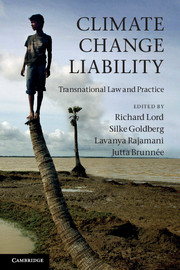Book contents
- Frontmatter
- Contents
- Contributors and Editorial Board members
- Foreword
- Acknowledgements
- Abbreviations
- Part I Legal, scientific and policy aspects
- Part II National laws
- Asia and Pacific
- Africa and the Middle East
- 10 Egypt
- 11 Israel
- 12 Kenya
- 13 South Africa
- Europe and Eurasia
- North America
- Central and South America
- Selected resources
- Index
- References
13 - South Africa
from Africa and the Middle East
Published online by Cambridge University Press: 05 June 2012
- Frontmatter
- Contents
- Contributors and Editorial Board members
- Foreword
- Acknowledgements
- Abbreviations
- Part I Legal, scientific and policy aspects
- Part II National laws
- Asia and Pacific
- Africa and the Middle East
- 10 Egypt
- 11 Israel
- 12 Kenya
- 13 South Africa
- Europe and Eurasia
- North America
- Central and South America
- Selected resources
- Index
- References
Summary
Introduction
13.01There are four main climate-determining factors in South Africa: the northward moving cold Benguela current along its western coast which originates in Antarctic waters; the southern flowing warm Agulhas current on the eastern seaboard originating in the tropics; the high central plateau known as the Highveld; and the resultant varying atmospheric conditions during winter and summer. The authorities predict that ‘by mid-century the South African coast will warm by around 1–2ºC, and the interior by around 2–3ºC. After 2050, warming is projected to reach around 3–4ºC along the coast, and 6–7 ºC in the interior’. These types of temperature changes will place a massive strain on an already water-stressed nation currently dealing with problems of poverty and unemployment, poor service delivery and low levels of education. These problems notwithstanding, the South African legal system itself appears well oriented to address the legal issues that are likely to arise with the onslaught of climate change.
13.02In April 1994 South Africa removed over 300 years of racially based government authority by adopting a democratic constitution. In doing so it transformed from a system of parliamentary sovereignty to a constitutional democracy underpinned by a progressive Bill of Rights contained in Chapter 2 of the Constitution which is now the supreme law. The Bill of Rights contains, amongst other things, an environmental right. Notwithstanding these developments, the historic Roman-Dutch legal system, a mixed legal system reflecting aspects of both the European civil law and the English common law traditions, was retained. This system, supplemented by a growing body of statute law, is to a large extent still intact today, provided that where there is conflict with the Constitution, the offending law must give way.
- Type
- Chapter
- Information
- Climate Change LiabilityTransnational Law and Practice, pp. 319 - 348Publisher: Cambridge University PressPrint publication year: 2011



